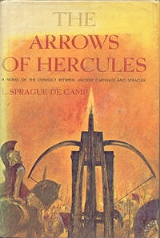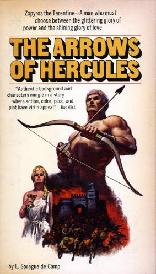
The Arrows of Hercules
Encyclopedia
The Arrows of Hercules is an historical novel
by L. Sprague de Camp
, first published in hardback by Doubleday in 1965 and in paperback by Curtis Books in 1970. It is the fourth of his historical novels in order of writing, and second chronologically, set in the time of Dionysios I of Syracuse
at the end of the fifth and beginning of the fourth centuries BC.
, a follower of the Pythagorean
philosophical
school. Having invented an improved type of catapult
, he is drafted into Syracuse
's war effort against Carthage
by the tyrant Dionysios, creator of the first military ordinance department known to history. The historical Battle of Motya
of 399 BC is a major event in the novel. Also portrayed is the incident upon which the legend of the Sword of Damocles
is supposedly based.

Historical novel
According to Encyclopædia Britannica, a historical novel is-Development:An early example of historical prose fiction is Luó Guànzhōng's 14th century Romance of the Three Kingdoms, which covers one of the most important periods of Chinese history and left a lasting impact on Chinese culture.The...
by L. Sprague de Camp
L. Sprague de Camp
Lyon Sprague de Camp was an American author of science fiction and fantasy books, non-fiction and biography. In a writing career spanning 60 years, he wrote over 100 books, including novels and notable works of non-fiction, including biographies of other important fantasy authors...
, first published in hardback by Doubleday in 1965 and in paperback by Curtis Books in 1970. It is the fourth of his historical novels in order of writing, and second chronologically, set in the time of Dionysios I of Syracuse
Dionysius I of Syracuse
Dionysius I or Dionysius the Elder was a Greek tyrant of Syracuse, in what is now Sicily, southern Italy. He conquered several cities in Sicily and southern Italy, opposed Carthage's influence in Sicily and made Syracuse the most powerful of the Western Greek colonies...
at the end of the fifth and beginning of the fourth centuries BC.
Plot summary
The protagonist is the engineer Zopyros of TarentumTaranto
Taranto is a coastal city in Apulia, Southern Italy. It is the capital of the Province of Taranto and is an important commercial port as well as the main Italian naval base....
, a follower of the Pythagorean
Pythagoreanism
Pythagoreanism was the system of esoteric and metaphysical beliefs held by Pythagoras and his followers, the Pythagoreans, who were considerably influenced by mathematics. Pythagoreanism originated in the 5th century BCE and greatly influenced Platonism...
philosophical
Philosophy
Philosophy is the study of general and fundamental problems, such as those connected with existence, knowledge, values, reason, mind, and language. Philosophy is distinguished from other ways of addressing such problems by its critical, generally systematic approach and its reliance on rational...
school. Having invented an improved type of catapult
Catapult
A catapult is a device used to throw or hurl a projectile a great distance without the aid of explosive devices—particularly various types of ancient and medieval siege engines. Although the catapult has been used since ancient times, it has proven to be one of the most effective mechanisms during...
, he is drafted into Syracuse
Syracuse, Italy
Syracuse is a historic city in Sicily, the capital of the province of Syracuse. The city is notable for its rich Greek history, culture, amphitheatres, architecture, and as the birthplace of the preeminent mathematician and engineer Archimedes. This 2,700-year-old city played a key role in...
's war effort against Carthage
Carthage
Carthage , implying it was a 'new Tyre') is a major urban centre that has existed for nearly 3,000 years on the Gulf of Tunis, developing from a Phoenician colony of the 1st millennium BC...
by the tyrant Dionysios, creator of the first military ordinance department known to history. The historical Battle of Motya
Motya
Motya , was an ancient and powerful city on an island off the west coast of Sicily, between Drepanum and Lilybaeum...
of 399 BC is a major event in the novel. Also portrayed is the incident upon which the legend of the Sword of Damocles
Damocles
Damocles is a figure featured in a single moral anecdote commonly referred to as "the Sword of Damocles," which was a late addition to classical Greek culture. The figure belongs properly to legend rather than Greek myth. The anecdote apparently figured in the lost history of Sicily by Timaeus of...
is supposedly based.


